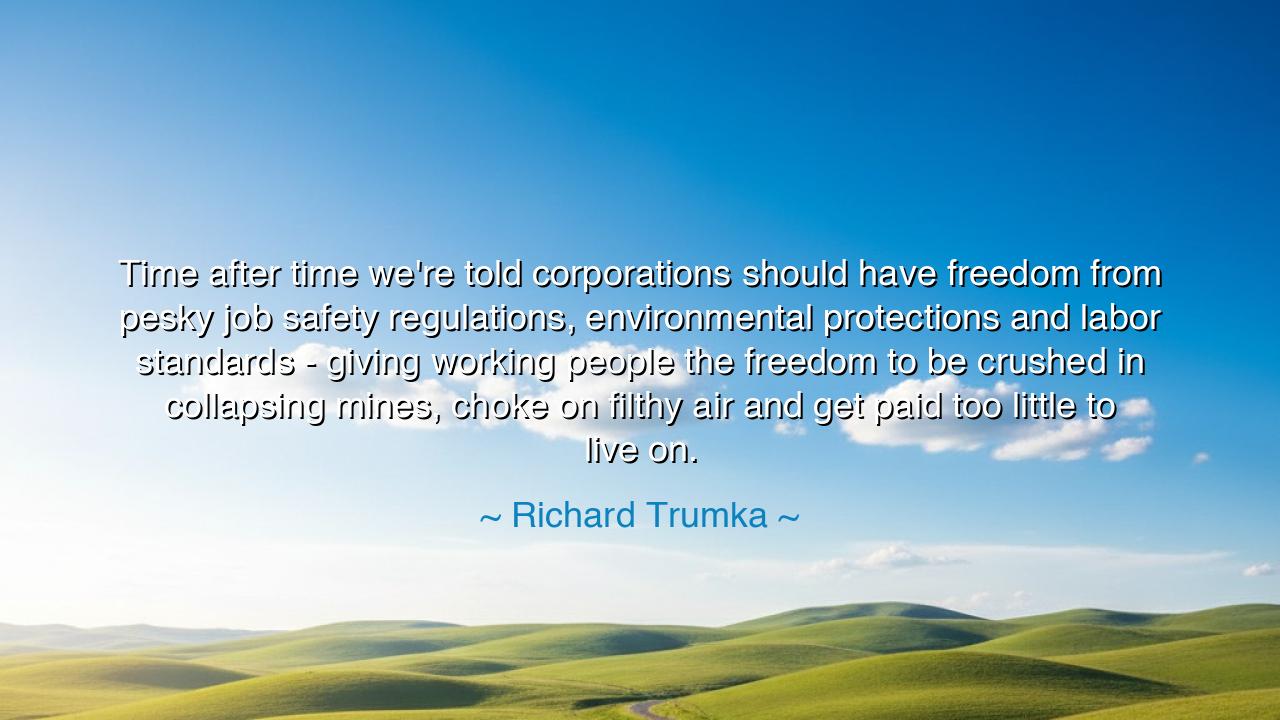
Time after time we're told corporations should have freedom from
Time after time we're told corporations should have freedom from pesky job safety regulations, environmental protections and labor standards - giving working people the freedom to be crushed in collapsing mines, choke on filthy air and get paid too little to live on.






The words of Richard Trumka, “Time after time we’re told corporations should have freedom from pesky job safety regulations, environmental protections and labor standards—giving working people the freedom to be crushed in collapsing mines, choke on filthy air and get paid too little to live on,” burn like a torch against the darkness of exploitation. They unmask the falsehood that the “freedom” of corporations is anything more than the bondage of workers. In his words, Trumka reveals the hypocrisy of a system that elevates profit above people, liberty above life, and greed above justice.
The origin of this saying lies in Trumka’s own life, for he was not merely a labor leader but a miner’s son, forged in the coalfields of Pennsylvania. He saw with his own eyes the black lungs, the collapsed tunnels, the families left destitute when fathers were buried beneath the earth. Rising to lead the AFL-CIO, he carried with him the memory of that suffering, and he used his voice as a weapon against those who sought to strip away the protections that had been bought with the blood of workers. His words were not crafted in comfort but carved in the stone of hard experience.
History itself confirms his wisdom. Recall the Triangle Shirtwaist Factory fire of 1911 in New York City. Young women, locked in their workplace so they could not steal moments of rest, perished by the dozens when flames consumed the building. Their deaths shocked a nation, but they also birthed labor laws, fire codes, and safety regulations that endure to this day. And yet, as Trumka warns, there are always those who call such protections “pesky,” who long to strip them away in the name of efficiency. The cost of that so-called freedom is measured not in dollars, but in lives.
The deeper meaning of Trumka’s words is that true freedom is not found in the absence of rules but in the presence of dignity. A man cannot be free if he must gamble his life in a collapsing mine to feed his family. A woman cannot be free if the air she breathes destroys her lungs before her time. A child cannot be free if the labor of their parents is rewarded with wages too meager to secure food and shelter. The laws that protect workers are not chains but shields, forged from the struggles of generations who refused to be treated as expendable.
Yet his saying also challenges us not to be lulled by false rhetoric. When we hear that corporations should be “free,” we must ask: free to do what? Free to pollute rivers, free to silence unions, free to drive wages into the dust? Such freedom is tyranny disguised in the garments of liberty. The ancients knew that freedom without justice is merely license for the powerful to prey upon the weak. The same truth endures today, and Trumka’s words echo as a clarion call: let us not surrender the hard-won protections of the people to the hunger of unchecked profit.
The lesson for us is clear: defend job safety, environmental protections, and labor standards as sacred pillars of a just society. Support unions, for they are the voices of the many against the few. Hold leaders accountable when they trade human lives for corporate gain. Refuse to be deceived by talk of “efficiency” when it is built on human suffering. Remember always that every regulation written in law is the ghost of a tragedy past, a testimony to lives lost that others might live.
Therefore, let us act with vigilance and with courage. Stand with those who labor in mines, in factories, in fields, for they bear the weight of civilization on their backs. Teach your children that prosperity without fairness is ruin, and that the strength of a nation is measured not by the wealth of its merchants but by the well-being of its workers. And in your own choices—as consumer, as citizen, as neighbor—choose to honor the dignity of labor.
So let Trumka’s words endure as a warning and a guide: freedom for corporations without justice is slavery for workers. Let future generations never forget that progress is not granted but won, and that every safeguard for the weak must be defended against the relentless hunger of the strong. For in this struggle lies the soul of humanity itself: whether we will live in a world where men and women are treated as tools to be used, or as human beings whose lives are sacred.






AAdministratorAdministrator
Welcome, honored guests. Please leave a comment, we will respond soon